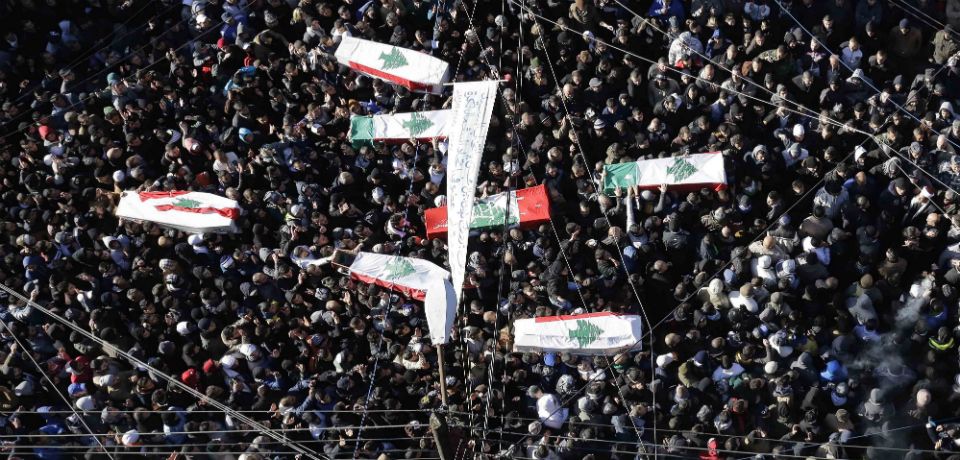
By
BEIRUT On Saturday night, Taha al-Khayal and Bilal al-Mariyan approached the Omran Café in the Lebanese city of Tripoli’s Jabal Mohsen district and blew themselves up. Khayal detonated his explosives inside the café. Mariyan arrived a few minutes later, apparently planning to target the crowd gathering around the site of the attack. Issa Khaddour, a resident of the neighborhood and father of seven, saw Mariyan approaching and tackled him, saving the lives of many but losing his own.
The twin suicide bombings were overshadowed by the fallout from the Charlie Hebdo killings, but their nine victims were no less innocent than the slain citizens in Paris. While the al Qaeda-affiliated al-Nusra Front militant group claimed responsibility for the attack, Lebanese Interior Minister Nohad Machnouk said that initial information suggested that it was the work of the Islamic State. Whatever the case, the attack marked the worst violence in Lebanon since the army clashed with Islamist militants in Tripoli in October, and renewed fears that the Syrian conflict was spilling over into the country.
Both Khayal and Mariyan were residents of Tripoli, hailing from a neighborhood bordering Jabal Mohsen. In many ways, the district in which they were raised and the district that they attacked are mirror images of one another. They are both very poor, lack job opportunities, and give many residents few options for education.
But residents of Jabal Mohsen are predominantly Alawites, the same sect as Syrian President Bashar al-Assad. Their neighbors are Sunnis. Pictures of Assad dot Jabal Mohsen and its dominant party is sympathetic to the Syrian regime. The Sunni areas largely support the Syrian rebellion.
Thus, terrorists like Khayal and Mariyan, who reportedly fought alongside jihadis on the Lebanese border, saw the residents of Jabal Mohsen as both political and religious enemies.
The blueprint for defusing tensions in Tripoli, which remains one of Lebanon’s most dangerous flashpoints, hasn’t changed very much in a half century. Khaled Sobh, a member of Tripoli’s municipal council, laid it out for me in November: more schools, more jobs, more opportunities for Lebanese youth to become something other than cheap thugs-for-hire in the Middle East’s political games.
“The problem is that there are a few youngsters who are unemployed, illiterate, and could be used by anybody [to further their political goals],” he said. “I am a member of the municipality, but I know we did not do enough.”
Sobh represents Bab al-Tabbaneh, an impoverished, predominantly Sunni neighborhood whose residents have a long history of clashing with Jabal Mohsen. He hands over a development plan that ticks off the dismal reality in his home district. The unemployment rate for Bab al-Tabbaneh and nearby neighborhoods stands at 72 percent. Some 82 percent of residents live below the poverty line.
Tripoli’s poverty, and its potential as a hotbed for political radicals, is an old story. USAID’s Office of Transition Initiatives, fearing political instability, has also become involved in Tripoli’s economic development. This, too, is an old story. An April 1959 State Department cable expressed fears that the city could become a Soviet stronghold in Lebanon. Tripoli “is severely depressed economically,” the cable warned, and as a consequence “is well endowed with the materials and situations upon which communism feeds.”
Nothing appears likely to change Tripoli’s basic economic conditions this time around, either. Sobh chuckled ruefully at the mention of millions of dollars in private donations by Sunni political leaders after the violence last October. The money, he said, always went into the pockets of their loyalists. The government programs weren’t much more efficient, he said. Sobh recounted how he once had to take a program to fill the potholes of Bab al-Tabbaneh to the head of the entire northern governorate, where it died on the bureaucrat’s desk.
“The politicians here don’t like you to be productive,” Sobh said. “Instead, they’d prefer you to be someone lazy, doing nothing.”
Paradoxically, the utter nihilism of the jihadis may actually be preventing the country from spiraling into a broader Sunni-Shiite conflict. In the aftermath of the attack in Jabal Mohsen, as with previous attacks, Lebanon’s mainstream Sunni parties lined up against groups like al-Nusra Front and the Islamic State. These Sunni parties remain anti-Assad, but are participating in a government with Hezbollah, which has intervened on behalf of the Syrian regime, because they fear a jihadi takeover.
Interior Minister Machnouk, a member of Lebanon’s predominantly Sunni Future Movement, is one example of this trend. In November, I paid a visit to him to ask why his party had joined a government with Hezbollah, and why it had seemingly retreated from any active effort to topple the Assad regime.
“We want to minimize the risk of moving the Syrian fire to Lebanon,” he said. “[Jihadis like al-Nusra Front or the Islamic State] don’t look like us, politically, and we don’t believe this is the way. This is not the regime we are looking to see in Syria or in any other Arab country. We are moderate, we believe that people should live together, that Lebanon is cosmopolitan, and has several religions in one country.”
Machnouk and other Sunni politicians have stuck to that line in recent days. The interior minister paid a visit to Jabal Mohsen shortly after the bombing, calling the attack “monstrous,” and Lebanese security forces cracked down on a notorious prison where inmates were allegedly connected to the attack.
With jihadis looking for a foothold in Lebanon, the mainstream Sunni political class has seemingly calculated that they are better off trying to minimize the spillover from the Syrian conflict than fighting their pro-Assad political rivals. It may not be a long-term solution for what ails Lebanon, but it could keep the Syrian war at bay for a little while longer.